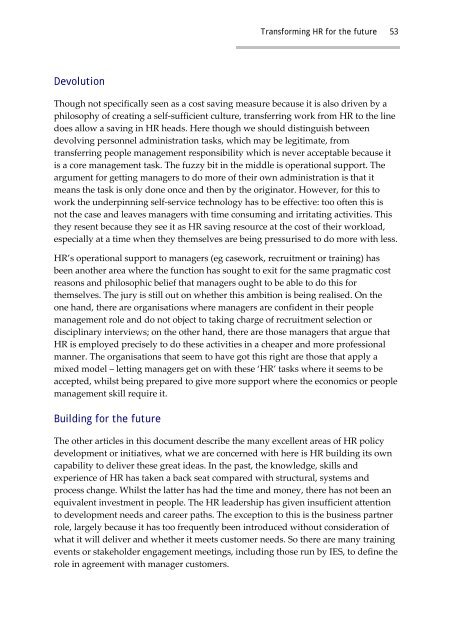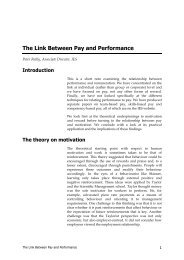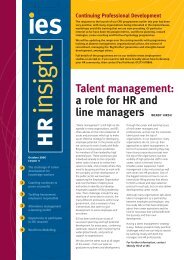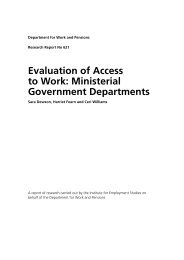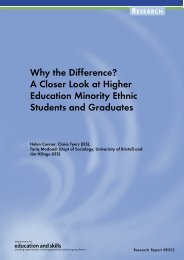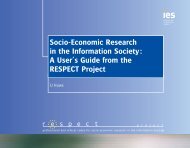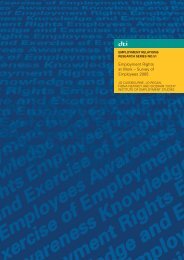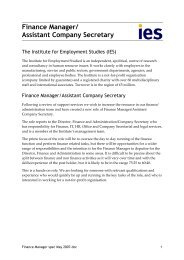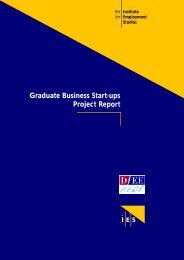PDF of this item - The Institute for Employment Studies
PDF of this item - The Institute for Employment Studies
PDF of this item - The Institute for Employment Studies
- No tags were found...
Create successful ePaper yourself
Turn your PDF publications into a flip-book with our unique Google optimized e-Paper software.
Trans<strong>for</strong>ming HR <strong>for</strong> the future 53DevolutionThough not specifically seen as a cost saving measure because it is also driven by aphilosophy <strong>of</strong> creating a self‐sufficient culture, transferring work from HR to the linedoes allow a saving in HR heads. Here though we should distinguish betweendevolving personnel administration tasks, which may be legitimate, fromtransferring people management responsibility which is never acceptable because itis a core management task. <strong>The</strong> fuzzy bit in the middle is operational support. <strong>The</strong>argument <strong>for</strong> getting managers to do more <strong>of</strong> their own administration is that itmeans the task is only done once and then by the originator. However, <strong>for</strong> <strong>this</strong> towork the underpinning self‐service technology has to be effective: too <strong>of</strong>ten <strong>this</strong> isnot the case and leaves managers with time consuming and irritating activities. Thisthey resent because they see it as HR saving resource at the cost <strong>of</strong> their workload,especially at a time when they themselves are being pressurised to do more with less.HR’s operational support to managers (eg casework, recruitment or training) hasbeen another area where the function has sought to exit <strong>for</strong> the same pragmatic costreasons and philosophic belief that managers ought to be able to do <strong>this</strong> <strong>for</strong>themselves. <strong>The</strong> jury is still out on whether <strong>this</strong> ambition is being realised. On theone hand, there are organisations where managers are confident in their peoplemanagement role and do not object to taking charge <strong>of</strong> recruitment selection ordisciplinary interviews; on the other hand, there are those managers that argue thatHR is employed precisely to do these activities in a cheaper and more pr<strong>of</strong>essionalmanner. <strong>The</strong> organisations that seem to have got <strong>this</strong> right are those that apply amixed model – letting managers get on with these ‘HR’ tasks where it seems to beaccepted, whilst being prepared to give more support where the economics or peoplemanagement skill require it.Building <strong>for</strong> the future<strong>The</strong> other articles in <strong>this</strong> document describe the many excellent areas <strong>of</strong> HR policydevelopment or initiatives, what we are concerned with here is HR building its owncapability to deliver these great ideas. In the past, the knowledge, skills andexperience <strong>of</strong> HR has taken a back seat compared with structural, systems andprocess change. Whilst the latter has had the time and money, there has not been anequivalent investment in people. <strong>The</strong> HR leadership has given insufficient attentionto development needs and career paths. <strong>The</strong> exception to <strong>this</strong> is the business partnerrole, largely because it has too frequently been introduced without consideration <strong>of</strong>what it will deliver and whether it meets customer needs. So there are many trainingevents or stakeholder engagement meetings, including those run by IES, to define therole in agreement with manager customers.


